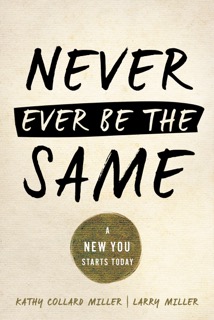Why Do I Do What I Do Wrong?
Kathy Collard Miller is an author and speaker who encourages women to apply practical principles from the Word of God. In this Attitude UPGRADE, she explores some ways to find the underlying  causes of destructive responses.
causes of destructive responses.
We’ve all said things like, “He makes me feel…” or “I feel bad when she does that.” But the truth is we are responsible for our own choices," Kathy says. "Putting that into practice can actually diminish unwise choices."
I (Dawn) think that is fascinating because so many people think they can grit their teeth and swear to never respond hurtfully again. I've done this—haven't you? Kathy's insights help us consider the "why" behind our responses.
She continues . . .
It’s easy to blame a person or circumstance for the way we’re acting, but the truth is our wrong reactions have a long history.
It’s true for all of us. We see the pain we cause others or even ourselves, and it seems like we should just grab God’s power and never do it again. But there are reasons for our continuing ungodly choices.
Here’s how to discover and correct the underlying causes.
1. Look to the past to see the beginning.
When painful things happen to us as children, we blame ourselves. We “hear” a message that somehow “I’m the cause. I must be hopeless, unloveable, incapable," etc.
When I was molested as an eight-year-old, I felt like a shameful little girl who should have prevented it from happening:
“I better act perfectly to hide my dirtiness.”
Of course those were lies, but I believed them.
Anytime someone implied I should do a better job at something, I became angry— blaming them; I didn’t want to be exposed as imperfect.
As an adult, by seeing the lies I was believing, I replaced it with God’s truth:
I wasn’t responsible for the abuse, and God loves me even though I’m imperfect.
Author Mike Wilkerson writes, “It’s not our raw experiences that determine our lives but the meaning we make of them—the stories we tell and the stories we believe.”
2. Look to the present to see the threat.
Every time we react sinfully (anger, contempt, procrastination, passive/aggressive, etc.) we feel like someone or something is threatening our good self-image, our comfort, our finances—anything we value.
Many times what we value become “idols.” We “worship” those rather than looking to God to define, comfort, or provide for us.
James wrote, “Instead you ought to say, ‘If the Lord wills, we will live and do this or that.’ As it is you boast in your arrogance. All such boasting is evil” (4:15-16).
The most difficult thing is surrendering to however God allows people to treat us or circumstances to assail us.
That doesn’t mean we never share our opinions or take action. But instead of automatically reacting, we must seek God first. Just because it seems “natural” to respond our usual way, we may not be reacting “supernaturally” in God’s power. Blaming, worry, defensiveness and other ungodly reactions seem to protect us but don’t bring glory to God or fulfill His will.
3. Look to God’s perspective of the person or situation.
When we overreact, we take other people’s actions personally. We feel like we’re back to being blamed, labeled or attacked like we were as children.
But most of the time, that person is just trying to protect themselves. It’s not about us, it’s about their insecurity or lack of trust in God.
And any difficult circumstances is God’s gift of transforming us, not to destroy us. Instead of fighting off the “threat,” we can look through God’s eyes of love and grace.
One perspective is to have “godly sorrow.” Godly sorrow sees another person’s attack as hurting them, not us.
The Apostle Paul wrote, “I am speaking the truth in Christ—I am not lying; my conscience bears me witness in the Holy Spirit—that I have great sorrow and unceasing anguish in my heart. For I could wish that I myself were accursed and cut off from Christ for the sake of my brothers, my kinsmen according to the flesh.” (Romans 9:1-3 ESV).
Can you imagine that kind of surrender?
Paul didn’t take their attacks personally; he wanted the best for them.
God can empower us to have that kind of reaction. We can be gracious as we speak the truth in love.
Which of those three insights would you like to concentrate on so that your “natural” reactions can turn into “supernatural” reactions?
 Kathy Collard Miller loves to help women trust God more through her 50 books and her speaking in over 30 states and 8 foreign countries. Visit her
Kathy Collard Miller loves to help women trust God more through her 50 books and her speaking in over 30 states and 8 foreign countries. Visit her  website/blog and discover more about her speaking ministry here. Kathy has authored many magazine articles and more than 50 books, including Partly Cloudy with Scattered Worries and her newest book Choices of the Heart, a Bible study, available here. The insights in this blog are based on her book Never Ever Be the Same: A New You Starts Today found here.
website/blog and discover more about her speaking ministry here. Kathy has authored many magazine articles and more than 50 books, including Partly Cloudy with Scattered Worries and her newest book Choices of the Heart, a Bible study, available here. The insights in this blog are based on her book Never Ever Be the Same: A New You Starts Today found here.
Graphic: courtesy of PourquoiPas, Pixabay.
 Post a Comment → Posted on
Post a Comment → Posted on  Thursday, September 1, 2016 at 8:31AM
Thursday, September 1, 2016 at 8:31AM 














